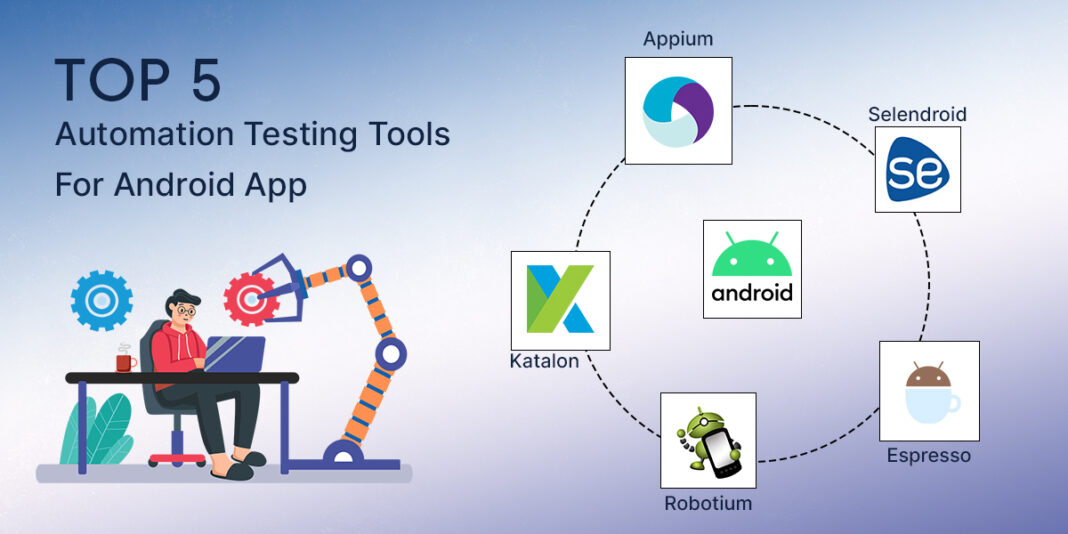Android is the most preferred Operating System by many numbers of developers. As of 2023, there are more than 3.6 Billion active android Smartphone users across the world. Google Play Store has more than 3.553 million apps that are quite accessible for download in 2023.
Based on the Statistics of Google Play App Revenue, Google Play Store has been generating US $42.3 billion in revenue from apps. In the below sections, we’ll be learning about top automation testing tools for Android apps.
What Is Android Automated Testing?
Android automation testing involves the unique process of testing the software framework and tools. These would automatically best the performance level, functionality, as well as usability of the Android applications.
These also involve various types of testing for creating scripts as well as automated tests. It will simulate user interactions with apps like entering text, tapping buttons, swiping screens, and more. Normally, Android app testing involves verifying as well as validating the compatibility of the Android application with varied devices and UI.
Android Automated Testing is a critical aspect of the Android app development life cycle. These would automatically ensure the quality and reliability of the app. These also help to easily identify and fix any issues or defects in the app.
Android App Testing Has More Numbers Of Techniques And Methodologies Like:
- Automated testing
- Manual testing
- Exploratory testing
- Regression testing
- Performance testing
Initially, the Android app testing was done manually, but it consumed more time. The Android platform gained more popularity with an advanced, scalable testing solution. Automated testing tools emerged in the modern day, providing a seamless and engaging experience.
Why Is Android Preferred Amongst The User And Developer Community?
The most important element for developing the mobile application is to adopt a suitable mobile app testing strategy. It involves various mobile QA tools for ensuring the maintenance of cost-effective and reliable attributes.
Below Are Some Of The Massive Advantages Of Using The Mobile App Testing Tool For The User And Developer Community:
- Android is an open-source system
- Quick Automated and cross-platform testing
- Easy to share test results
- Perform quality assurance tests
- Long-term cost reduction
- Faster and reliable execution
- Extensive user base
- Caters to multiple audiences having the smartphones
- Easy to Learn app development on the Android platform
- Open-source community and contribution forum
The main goal of Automation Testing Tools is to ensure the App meets all requirements and expectations of users. These would deliver a completely seamless experience for the user. Android Testing is performed to deliver high-quality apps along with attaining the best results.
Top Android App Automation Testing Tools:
Top Automation Testing Tools for Android apps have been listed based on numerous factors. These assist with completely managing and implementing the mobile app testing strategies. It is suitable for both commercial and free mobile automation testing tools.
1. Appium:
Appium is one of the reliable open-source app testing tools preferred by many developers. Appium is a cross-platform testing framework. It is known for the complete flexibility of testing. These allow the QAs to extensively check on the Test scripts against the numerous platforms. This includes Windows, Android, and iOS.
Appium supports multiple programming languages as well as testing frameworks. These extensively make Appium an easy-to-use feature. Appium is compatible with native and hybrid apps. These also support emulators and real devices. Its features make it completely suitable for testing a range of applications. Getting good results with bug-free apps and cross-platform support is a suitable option.
Key Feature:
- Free and open-source
- Automated testing of native, mobile, and hybrid web applications
- Supports real devices and emulators
- Supports multiple programming languages such as Ruby, Java, Python, and more
- Supports testing frameworks
2. Selendroid:
Selendroid is based on the Selenium framework, which is used for accurate Android app testing. Selendroid is perfect for driving the UI of Hybrid and Native apps. Selendroid is suitable for Android emulators and actual devices.
It provides the best recording and playback features. Selendroid can easily combine with frameworks like the JUnit. These provide better cross-platform support with unique export options for the languages like Java, Python, Java Python, and more.
Key Feature:
- Full compatibility with JSON Wire Protocol
- Multi-Browser Support
- Performance and Speed
- Easy Identification
- Multi-Language Compatibility
- Dynamic Web Elements
- Testing mobile app using Android driver web view app
- UI elements found with different locator types
- Similar to automating native or hybrid apps
- No modification of the app to automate it
3. Espresso:
The Espresso is a unique open-source app testing tool suitable for testing the UI. These involve the Android testing framework, which Google develops. Espresso is also known for its simplicity, flexibility, and robustness. These involve core features like Synchronized test executions.
The Framework has the capability to run varied elements. Espresso provides developers to easily test Android Native views and Hybrid web views. Espresso supports test scripts along with Java and Kotlin. These also extensively support black-box testing with the testing of components.
The open-source testing tool is designed for Android app developers to test the UI during development cycles. Espresso provides the faster and most reliable test execution. It is also the ideal option for developers who especially require feedback for performance.
Key Feature:
- Open-source and free
- Fast and reliable test execution
- Supports automated UI testing
- Supports multiple Android versions
4. Robotium:
Robotium is a unique Android testing framework that is designed for automated UI testing. Robotium is known for the ultimate easy-to-use APIs, which make writing tests simple.
Robotium allows the developers to write test cases for easily automating user action. These include clicking, scrolling, entering text, and many others in the apps. A reliable Android app development company has been using Robotium and other Automation Testing Tools for Android apps.
Normally, these make the developers conveniently test apps across varied physical devices and emulators. The tool is an excellent tool for testing complex applications for more significant numbers of cases.
Robotium lets you easily write automated test cases. Many Test case developers have been using the Robotium to easily define the function, acceptance, and system. Robotium tool may be used to test apps which include the source code and apps.
Key Features:
- Supports Automated UI testing
- Automated test cases for Hybrid and Native app testing
- Robust test scripts
- Powerful APIs for writing tests
- Supports multiple Android versions
- automatic GUI test cases for Android apps
5. Katalon:
The Katalon is an amazing codeless automation testing tool. Normally, it has been built based on the Appium and Selenium-based engines. Katalon gives complete platform support for executing the tests on all Operating systems, devices, and browsers.
Katalon uses charts, graphs, as well as reports to visualize the test data. Katalon lets you operate on cloud and on-premise infrastructures, so many developers have preferred it.
Key Features:
- Codeless testing experience
- Flexible test reusability on web, API, and mobile platforms
- Simple setup
- Easy test creation
- It uses keywords, images, records, as well as playback features
- No complex programming background
- Built-in integration
- Popularly used project management tools like JIRA
Conclusion:
Android holds a 71% market share. Android testers require a robust process for testing Android apps. The Automating App testing process is quite helpful for scaling up their device coverage. Above are some of the app automation testing tools and frameworks that exist in the market.
Author Bio:
Jatin Savaliya has been working with Best Remote Team an India-based offshore mobile app development company. He is a technology enthusiast and writes content to provide readers with insights about various technologies and related trends.








